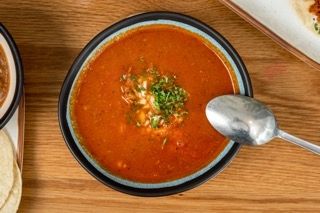Is Mexican Food Healthy? Unpacking the Nutritional Advantages of Standard Active Ingredients
The inquiry of whether Mexican food is healthy welcomes an exploration of its typical active ingredients. Beans and corn act as fundamental staples, abundant in protein and fiber. Avocados supply advantageous fats, while various natural herbs and spices include flavor and health and wellness benefits - happy hour. Together, these components develop a tapestry of nourishment. The healthfulness of Mexican cuisine commonly depends on prep work approaches and part sizes. What duty do these elements play in identifying its general nutritional value?
The Power of Beans: Protein and Fiber-Rich Staples
Typically overlooked, beans serve as a keystone of Mexican food, providing a wealth of dietary benefits. Rich in healthy protein, they are an outstanding plant-based option for those seeking to fulfill their nutritional healthy protein requires. This high healthy protein material supports muscular tissue repair service and development, making beans very useful for both vegetarians and meat-eaters alike. In addition, beans are an outstanding source of dietary fiber, which aids in food digestion and promotes a sensation of fullness, possibly aiding with weight monitoring.
The variety of beans used in Mexican recipes, such as black beans, pinto beans, and kidney beans, adds to a varied taste account and can improve meals nutritionally. Beans are low in fat and consist of crucial vitamins and minerals, consisting of magnesium, iron, and folate. Together, these qualities make beans an important component, supplying both nourishment and sustenance in typical Mexican price.
Corn: a Versatile Grain With Nutritional Conveniences
Corn sticks out as a versatile grain essential to Mexican food, commemorated not only for its cooking applications but additionally for its excellent nutritional account. As a key active ingredient in meals like tortillas, tamales, and pozole, corn gives essential nutrients that add to a balanced diet plan. Rich in carbohydrates, it functions as a significant energy resource, while also being low in fat, making it a beneficial alternative for numerous nutritional needs.
Furthermore, corn is a good resource of dietary fiber, which aids in food digestion and promotes satiety. It contains considerable amounts of vitamins such as B-complex vitamins, which are important for basal metabolism. The presence of anti-oxidants, especially carotenoids, adds to overall health and wellness by minimizing oxidative stress and anxiety. Additionally, corn is gluten-free, dealing with those with gluten level of sensitivities. In general, the dietary advantages of corn emphasize its relevance in standard Mexican food and its function in a healthy and balanced diet plan.
Avocados: Healthy Fats and Nutrients in Every Bite
Avocados play a substantial duty in Mexican cuisine, enhancing meals with their creamy appearance and abundant taste. Beyond their culinary appeal, avocados are commemorated for their excellent nutritional profile. They are an abundant resource of healthy monounsaturated fats, which can assist reduced negative cholesterol degrees and support heart wellness. In addition, avocados are loaded with necessary vitamins and minerals, including potassium, vitamin E, and B vitamins, adding to overall wellness.
The high fiber content in avocados help food digestion and promotes satiation, making them a useful enhancement to any kind of meal. Their one-of-a-kind nutrient make-up can also support skin health and give anti-inflammatory advantages. Integrating avocados into typical Mexican recipes or enjoying them as a standalone snack can boost both flavor and nutrition, demonstrating why they are a precious staple in Mexican food. On the whole, avocados offer a scrumptious way to appreciate healthy and balanced fats and vital nutrients in every bite.

Spices and Herbs: Flavorful Health And Wellness Boosters
While taking pleasure in the abundant tastes of Mexican cuisine, one can not forget the important function that spices and natural herbs play in boosting both preference and wellness. Components such as cilantro, chili, and oregano peppers not only contribute to the vibrant taste profile yet likewise provide considerable health and wellness benefits. Cilantro is recognized for its cleansing residential properties, assisting to remove heavy metals from the body, while oregano is packed with anti-oxidants and possesses anti-inflammatory effects.
Chili peppers, a staple in lots of Mexican meals, consist of capsaicin, which has been connected to improved metabolic process and discomfort relief. Additionally, seasonings like cumin and coriander assistance food digestion and might aid in blood sugar law. Including these tasty wellness boosters right into dishes not only boosts the culinary experience however additionally advertises total well-being, making Mexican cuisine not just tasty, however likewise nutritionally useful.
Traditional Food Preparation Techniques: Enhancing Nourishment and Taste
Traditional cooking methods in Mexican cuisine play an important duty in boosting both nutrition and flavor, as they often focus on time-honored techniques and fresh active ingredients. Techniques such as nixtamalization, where corn is soaked and prepared in an alkaline remedy, not just improve the nutrient profile of tortillas however additionally improve their digestibility - lunch and dinner. Furthermore, using slow-moving food preparation approaches, like stewing or braising, permits tastes to fuse beautifully while preserving the stability of the components

Frequently Asked Concerns
Are Mexican Food Portions Typically Larger Than Other Foods?
Mexican food portions are commonly larger than those of many other foods. This characteristic reflects conventional eating methods, stressing communal sharing and hearty dishes, which can lead to a much more considerable offering size generally.
How Does the Prep Work Approach Affect Healthfulness of Mexican Food?
Prep work approaches greatly influence the healthiness of Mexican food. Strategies such as cooking or steaming preserve nutrients, while frying can increase undesirable fat material. Choices of active ingredients and cooking styles ultimately identify overall dietary worth.
Can Mexican Food Be Tailored for Certain Dietary Limitations?
Mexican food can undoubtedly be customized for certain dietary restrictions. Substitutions, such as utilizing corn tortillas for gluten-free diet plans or integrating more vegetables, enable people to appreciate typical flavors while fitting different nutritional needs.
What Prevail Mistaken Beliefs About Mexican Food and Health And Wellness?
Typical misunderstandings concerning Mexican food consist of the belief that it is naturally unhealthy, extremely zesty, and entirely concentrated on fats. Actually, typical dishes typically include healthy active ingredients and can be customized to various dietary demands.
Exist Much Healthier Alternatives at Mexican Dining Establishments?
Much healthier alternatives at Mexican dining establishments usually include smoked meats, beans, and fresh veggies. Choosing dishes that highlight whole ingredients and staying clear of heavy sauces can result in a much more nourishing dining experience, promoting total wellness.
The range of beans used in Mexican dishes, such as black beans, pinto beans, and kidney beans, contributes to a diverse flavor account and can improve meals nutritionally. Avocados play a considerable function in Mexican cuisine, complementing meals with their velvety structure and rich flavor. Including avocados right into conventional Mexican meals or appreciating them as a standalone treat can improve both flavor and nutrition, showing why they are a precious staple in Mexican food. While taking pleasure in the abundant tastes of Mexican food, one can not neglect the important role that spices and natural herbs play in boosting both taste and wellness. Standard cooking approaches in Mexican tacos food play a vital duty in improving both nutrition and taste, as they usually prioritize fresh components and classic strategies.